#religious themes and motifs through horror
Text
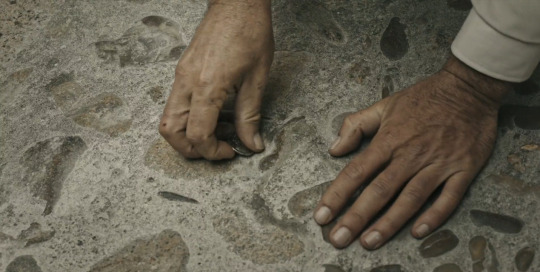



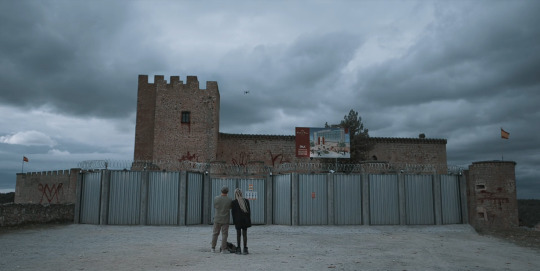

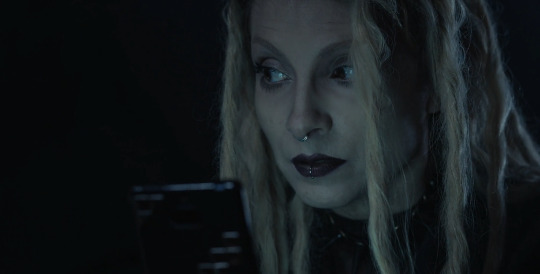
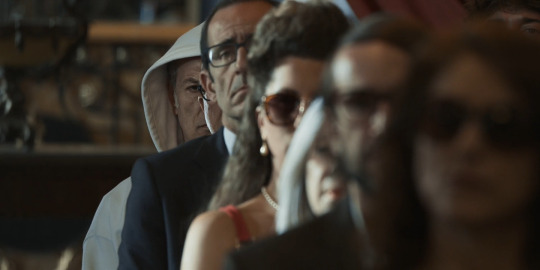

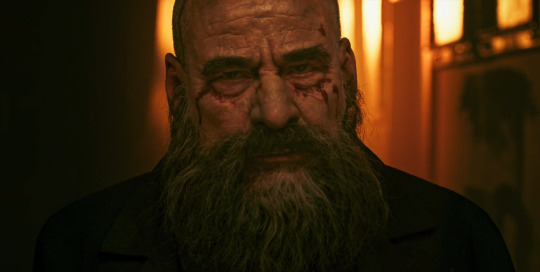
30 MONEDAS
S02 E01 - El pueblo fantasma
#tumblr should be obsessed with this why is tumblr not obsessed with this#religious themes and motifs through horror#30 monedas#30 coins#paco yendo a ver a elena todos los días con una rosa? pues me muero#vergara en el infierno luchando contra bichos del infierno para decirle a elena algo importante porque la quiere? pues me muero#najwa nimri? simbología religiosa por todas partes? kant agujeros negros pan de gasolinera etc etc amo esta serie
43 notes
·
View notes
Note
wilbur, tell us about your feelings and thoughts on hodge!! is he one of your faves?? who do you like shipping him with? what's his gender and favourite colour??

You've come looking for my feelings and thoughts on Hodgson!
Headcannons and thoughts below.
Hodgson is... one of my favourites. Yes. We can say that safely. I have a broad sort of... Opinion on Hodgson from both a Terror perspective and a historical individual which sort of has given me a, we'll call him a "rpf". I did put together a large file of data regarding Hodgson's existence through history. So this is coupled with texts and readings from other various Franklin Expedition books as well as other materials and ... "Sources".
So for thoughts or headcannons...
He's well read and a romantic. In love with the world and poetry to describe it. He is literate in several languages with a broad spectrum of diverse literary backgrounds and enjoys theatre but not as much as he wishes. Simply because none of his favourite stories and literatures are often made into plays.
He can play the piano and violin but is only alright at the piano. He prefers string instruments.
He prefers romantic novels and stories to horror but does prefer it if the books refer to oceanic adventures and likes "sea horror" versus gothic horror. Though he did find "The Castle of Otranto" to be surprisingly good and owns two copies by accident.
I have a broad amount of "headcannons" regarding Hodgson that've grown substantially over the months. Some of which include, of course, interpersonal dynamics between him and his friends.
He did, of course, know James before the Expedition. Both he and James fought pirates together, actually, during one of their voyages. They have a much closer relationship than what is depicted in "The Terror".
They had both served in the same battles aboard the Cornwallis during the First Opium War.
I ship him with both James and Dundy as they were all rather close friends as well but imagine him as having a degree of a fascination with the substantiation of certain religious themes which he is attracted to in an almost kinky way. Additionally, I imagine him having a passive but hungry fascination with one of the Barrow sons.
This also ties into the concept that he's religious and is sort of "Christian" in a way. But he believes in God allegorically and poetically rather than a literal construct or concept. He's not capable of fanatical thinking or subscribing so densely to a religious ideology in such a way that he could dedicate himself to a singular pattern of thinking and believing in the world - certainly not with how broadly read, educated, and travelled that he is. Such concepts to box the world he has seen into a narrow confine of a book is simply not logical nor possible to him. But the motifs and themes of the predominant religions, to him, are a sort of... food he likes to eat. He's too philosophical to be taken over by one idea. But he does like the idea of the almost sensual allure of Christian themes. There's a romanticism there that he's appealed by and this has him using those themes a little in his social dynamics. Especially if he's trying to get under John Irving's skin or psychologically torment challenge some of James and his other more... conservative friends.
Do not even get him started on St. Sebastian.
I imagine that he probably was with somewhat long brown wavy hair (not quite curly but almost there) like his sister. And green eyes, historically. But that's just a personal idea.
His gender is Second Leftenant. Hands down. Well. Sort of. In a way, I imagine him having an idea of Gender being more in tune with your flexibility on the ocean. In tune with the sea. Very romantic towards the ocean and the struggles of natural life and the turmoil of the oceans as a whole, I imagine he has a fluid gender that connects well to roles on ships. Which is where my whole drunken ramble actually comes from, if you have not seen it yet. I could refine it more. But that's the cruse and misshapen version of it.
As for favourite colours, I think of him having a fondness for the hues and tones of the ocean as the gradients go from pale blues to deep blues with the fathoms and leagues increasing the further out you go. Also very fond of the tones and hues of the night sky and the blue-blacks that erupt from dawn and dusk.

How did I do?
#george hodgson#the terror#franklin expedition#jonathanlejonhjarta#Thank you for visiting!#Were these what you wanted?#Did you enjoy?
15 notes
·
View notes
Note
general propaganda :
I've seen a few ppl mixing up "themes" and "motifs", in their defence propaganda, so they explain how how their characters reflect certain Flesh imagery, but NOT how they manifest the core conceptual fear! Lots of characters have horrific bodies, are cannibals, or use religious iconography, but these do not necessarily point towards Flesh! The core theme of Flesh is (imo) objectification/commodification/depersonalisation (dunno if there's a more encompassing word).
"Meat is me" isn't about the eating, it's about the hollowness.
This CAN tie into Christian imagery through the Eucharist turning 1 man's personal sacrifice into a mass-producable non-individual consumable, OR specifically as a CONTRAST to spiritualism since Flesh denies the spiritual concept of soul that separates people from animals or animals from objects - however, something isn't Flesh JUST because it includes ANY religious imagery! Religion, in general, doesn't point to Flesh any more than it points to Spiral, Vast, End, Desolation, Corruption, Extinction or Eye, which all use religious imagery too, without context of WHAT the imagery evokes.
Body horror is similarly Flesh because it deals with a disconnect of the soul/mind and the material body, the incongruency of personhood as a distinct thing. Jared's garden domain doesn't just feed on body dysmorphia, it turns those who suffer it into literal inanimate plants - technically alive, but wholly inanimate. Much of modern body dysmorphia is also result of commercial efforts to defamiliarize the self.
Cannibalism isn't Fleshy just because "yucky gore" or "eww meat", it's specifically Flesh because it treats people as a consumable resource - look back at the Trail Rations episode, think of how religion frames the whole thing is: the woman is not afraid of the gore or violence nearly as much as she is shames to tarnish her soul and her husband's memory. Sure, Jon getting his rib pulled out may hurt immensely, but the symbolic Fleshiness of it is that something is being removed from himself and turned into a tool, revealed as simply A Thing to be used. The butchery is no more a prayer to Flesh than any other harvest.
So, I implore y'all - DON'T just vote for characters based simply on APPARENT similarities to canon examples, think about what DRIVES them! Are the motifs tangential, or are the themes reflected?
.
27 notes
·
View notes
Text
spicy meatballs SH takes
Parallel worlds theory is bullshit. There is only one reality which gets overwritten by the Otherworld; Harry says as much in SH1. He faints during Otherworld shifts because reality is literally changing right before his eyes and his mind shuts down trying to process it. Furthermore, a 1999 SH1 strategy guide likens the cycle of the Otherworld to the stages of REM sleep.
Full circle theory is bullshit. Silent Hill doesn't want to punish or rehabilitate people. Silent Hill doesn't want anything. Whatever you think you deserve is what you'll see.
Silent Hill is also capable of giving people what they want, if only briefly. Eddie, a pizza; James, a healthy "wife"; Angela, to see her mother again.
The cult calls themselves "the Organization." Outsiders call it "the Order."
At this point, the "muh trauma and guilt" stuff outnumbers the cult stuff by a wide margin. It's beyond moot to complain about cult stuff.
The cult is actually pretty interesting; it's just that the later games tack on nonsensical additions.
Silent Hill's horror encompasses a lot more than just themes of personal trauma and guilt. Pigeonholing it into those themes over and over again does the franchise a disservice.
"Samael" is some demonic-sounding bullshit Dahlia made up in order to scare Harry. It's not an actual being in the mythos except as a derogatory name the Order's opponents call their God.
Silent Hill is not sentient. It merely gives people the impression that it is.
SH3 deserves better than to be labeled as just "women's horror" on the basis of its pregnancy and menstruation motifs. It's also a coming-of-age tale that tackles themes of suffering, abuse, religious trauma, growing up, sin, and responsibility.
SH3 would probably have been as good as SH2 had it had more time to bake in the oven.
Silent Hill does not automatically lure the guilty. In fact, I could make an extremely faint case that kindness draws one to Silent Hill as well, seeing as how many of the innocents that go there do so through a combination of bad luck and kindness ex. Eileen offering Walter her doll; Harry and his wife taking Cheryl home; Douglas taking up Claudia's case to find a kidnapped girl, later compelled to help Heather
It's not ash. It's snow. Kaufmann remarks that "it's snowing. This time of year."
In Water was probably not the developers' intended ending; the narrative explicitly condemns suicide via James' dialogue, probably hinting at the team's own views. This is bolstered by the fact that the game's programming leans the most away from In Water whenever you start fresh on SH2, giving it the lowest initial score of the three endings.
5 notes
·
View notes
Text
Stephen's Interests, Part 1
As I read his novels and collections, I’ve noticed that King has a couple recurring themes. I’m not the first person to recognize patterns and motifs in King’s body of work (he is one of the most prolific and best-selling authors of the past fifty years or so). King’s writing acts as a house, not sane, standing by itself against its hills, holding darkness within. Something haunts King and his work.
The first novel King published was Carrie, a short narrative about the psychic awakening and vengeance of Carrie White in the context of religious abuse, near-total social ostracization, and bullying-cum-assault. It is here that I first read King’s stylistic representation of
(telepathy)
mid-text interruptions. Sometimes I’m reading a King novel, and I think it’s going to end without an instance of this parenthetical psychic message because why would it? The narrative doesn’t have to center on psychic or telepathic abilities; King breaks his own text to interject with a scream from the mind of someone (or something).
King has his vices: writers as (self-insert) main characters, evil cars, the Boston Red Sox, Good versus Evil, the entire state of Maine, processing his struggles with addiction and health through his writing, a neoliberal worldview, a strong focus on domestic abuse, more slurs than I even knew existed, the fear of the loss of a child, and that classic Maine “Ayuh.” King writes what he knows: Maine horror stories. He is after all, only human. What compels me about King and his work is the perspective he writes from, how he sees the world and its systems, what scares him of and—perhaps more tellingly—what doesn’t.
I know that at some point I will formalize my thoughts and observations. Until then, I’ll keep adding to this catchall tag (#interests) for my musings on how King’s interests are made manifest in his writing.
2 notes
·
View notes
Note
hi! who and what is the guy that made you forget greek mythology exists!
Hi, thank you for asking


(first image by @gh0stbreath second I drew over a meme)
his name is
Icarus
Also I tend to write characters more on the natural/realistic side so I hope you're not disappointed he's not a wretched fantastical beast or a dude with super cool powers he's just a guy. He could be your neighbor for all we're concerned. Read more bc I can't shut up about him
He just. Looks very normal. He's a tiny gay loser car salesman from Boston with a husband and children, negative credit score, 30k in debt and in the sights of loan sharks because he's too stubborn to get through his head that his dream of being self made and successful is never gonna be realized. He also has a penchant for religion, although he stops going to church to get more time to try to make his business work. His dream is to have a successful job, a beautiful family, and being a pillar of community – he's the guy the American Dream is marketing itself to, and the kind of guy who's most let down by it
He gets tied up in some mafia business when they put him as a front for their own business in exchange of letting his debts go and leaving his family out of it, and he promptly uses it to abandon the aforementioned family, get filthy stinking rich, invest heavily in advertising and become one of the most well-known faces in New England & the East Coast in general because his face would be in almost every ad running on TV at the time. He also had a huge liking of fashion and apparel in general so he had a bunch of clothing lines, perfumes and accessories named after him. He also developed like 5 different mental illnesses from it because by the time he was famous he was also in his 40s and he experienced the most hardcore midlife crisis ever trying to keep up with the socialites and rich kids he'd surround himself with.
Then when the mafia drops him and it turns out most of his fortune was inflated by an overcomplicated money laundering scheme he sort of starts to experience the Horrors as he starts getting increasingly desperate to keep his life afloat due to all the mental illness he's accumulated, and after a particularly bad trip on LSD where he sees every version of himself from the past and future and beats the shit out of himself he decides he needs to shape up and let this life go for his own sake. So he calls his (now ex)husband and asks to go back into his life and he goes through this whole 20 year long healing arc with a lot of therapy and finds a new and exciting gender for himself (guy who is a mom)
Some other random facts about him is that he's catty, physically fragile, lowkey slutty and loves to overindulge himself. He can be very blunt and says the most insane things. As an old man (around 60) he has a tumblr blog where he ends up being like a B-celebrity. He enjoys serious and artsy media and his favorite book/movie of all time is American Psycho. He relates to Patrick Bateman because he believes him to be the sort of guy he could turn into if he let himself stay in the rich life for longer without seeking proper help, and being able to look at that guy and go "lol glad that's not me anymore" makes him feel Normal
As you can tell if you squint, his life story more or less mirrors the tale of Icarus, with the exception of the healing arc bit (he was saved from falling in the ocean!!), plus with his whole religious theme he also gets a "fallen angel" sort of motif that fits very well. There's more stuff to his life that makes his name and theming more interesting but I don't wanna keep you here all day
Here's his playlist organized chronologically also it's full of bangers
So yeah with all these themes you can tell every time someone talks about the myth of Icarus I just go "ooooo just like my blorbo" and forget that I made him close to the myth on purpose
You can also find posts I tag as him [here]
#gigglingauspice#mafa answers#mafa talks a lot#mafa writes#icarusposting#AAAAAA MY BLORBO#one time i made him on sims 2 and his first job was a yoga teacher#and he injured his leg but was very brave about it but then it got Worse and he got fired#that was his first day at the job by the way#he fell down like a wounded gazelle#then he went home and made homemade soup and cried
11 notes
·
View notes
Text
3/60 Watching Every Non-US Shudder Original Film (Not Sponsored)

Film: Satan’s Slaves (Pengabdi Setan) (2017)
Country Of Origin: Indonesia
Language: Indonesian
Runtime: 110 minutes
Shudder Synopsis: When a famous singer dies from a mysterious illness, her family feels her presence linger, and a horrifying saga begins.
Director: Joko Anwar
Writer: Joko Anwar
Cast: Tara Basro, Bront Palarae, Dimas Aditya, Endy Arfian, Nasar Anuz.
Pre-Thots: I knew nothing (as I prefer), and from the title and poster image, I was expecting occult/supernatural/religious themes.
Post-Thots: I got what I expected, which means the title and poster sell the film well.
This is my first Indonesian horror film, and I think my first piece of Indonesian media at all (which is a little shameful considering Indonesia is so close to Australia, and you’d hope we’d more Indonesian media, but I digress). But due to this newness, I think some of themes flew over my head, especially in terms of cultural, humour, and religious elements.
Posi-Thots: The film has a specific feel, colour palette, and visual language. It’s something very particular, which I found refreshing from a filmmaking POV and unsettling as the viewer.
The scares were well executed, very bump-in-the-night type of spooks.
There were also a lot of tactile and physical elements, the house, vinyl records, sheets, candles, kerosene lamps, no mobile phones. Creating a sort of modern-gothic feel, something just out of modernity, but very familiar.
Also! Ooooh, I loved this! There was a great motif of a ringing bell, which was all hair-raising scary to me. Fantastic motif.
Techni-Thots: The make-up and prosthetics were really well done, and all practical, which I notice a lot of horror fans really prefer, me too. It added this great grit to the film, which added to it’s tactile, grounded feel.
As mentioned, this film has a specific visual language. There’s what appears to be a few zooms, rather than pans or dollys, which added something very particular, as I don’t see zooms a lot in film.
Harsh-Thots: There was something odd and noticeable going on with lead actor’s (Tara Basro) hair. I don’t know if it was extensions that weren’t covered well, or an odd haircut, but I found it distracting.
BONUS! Shudder-Thots: There’s some dialogue-heavy parts, in which the subtitles move too fast, and without a keystroke command to rewind and/or pause on Shudder, it was a fiddley task to actually get all the information in those scenes. I put the blame on Shudder, their player should be controllable through keystrokes on PC.
Personal Sub-Genres: Gothic Horror, Haunted House, Occult
Rating: 4/5
Who Might Enjoy It: Fans of gothic horror, and those who prefer little to no gore. Also, those who enjoy foreign language films. Perhaps one to watch with non-horror fans.
Who Might Not Like It: Those who don’t like gothic horror, or not open to family horror, occult themes, and haunted house stories. Those not open to foreign language films (though there is an English dub version on Shudder).
#satans slaves 2017#satan's slaves 2017#indonesian film#horror movie#film review#shudder#foreign film#gothic horror#haunted house#neptune watches shudder
6 notes
·
View notes
Photo

Drafting the Adventure: Using the Divine in your Games
After some of my recent Monsters Reimagined series focused on some of the gods, I had more than one person in the replies asking some version of the same question:
Why are you talking about the “ideology” of the gods and what they “represent”, don’t deities in d&d actually exist?
I knew that I wanted to respond to this, but I had to spend a couple days chewing it over. I’ve likely ranted about the topic in one form or another over my years as a DM, but I greatly dislike the way that default d&d handles its gods, from stripping everything but the barest description of them from the player’s handbook to canonizing them as powerful npc figures that are in a sort of cosmic holding pattern: all powerful, but at the same time so far removed from the things they are purported to care about that the best they can do is sometimes answering the prayers of high level clerics.
This hamstrings the storytelling potential of using gods in your game, removing any of the nuanced themes of faith, devotion, or spirituality you might want to explore with a character. See also my post about fiends, where I talk about how the “great wheel” cosmology totally screws up anything involving morality by making evil not only a distinct thing, but a place you can walk to, and a creature you can kill.
To that end, I want to talk for a bit about why gods in d&d ended up like this, and a way you can include them in your campaigns( and religions in general) to the best effect. TLDR: Rather than powerful NPCS, gods are way more useful as a component of the mythology you do your world/culture building around. Likewise, gods existing in a quasi-real state allows you to use them as powerful “living themes” within your story, driving the action while still playing with elements of faith and belief
Rather than list out all the reasons that gods (and religion in general) in d&d are not well implemented, let me lay out a few ideas of how I think they could be utilized for fullest narrative effect:
Starting off, lets get rid of the idea of deities as epic level creatures who are battling over the multiverse: Having to juggle a bunch of omnipotent power players is a headache when it comes to creating a campaign world and it forces the dm to tie the cosmology into knots to explain why the gods haven’t settled all of the problems already.
The divine should ”exist” in your campaign the same way that magic exists, as a force of power and wonder that are included in the narrative in order to better realize the themes of your story: This is why I make sure to have every god I introduce into my campaigns MEAN something, either to put a face on an important motif within the adventure, to provide insight into the world the players are traveling through, or to embody an ideology that may compliment or contrast the characters’ own.
Likewise, having your pantheon exist on a material level, rather than a thematic level totally negates the need for belief: You can’t write a religious schism or crisis of faith or corrupt clergy if the ultimate abiders of right and wrong are just a sending spell away. D&D tries to get around this by having its gods be removed and inaccessible for one reason or another, but it doesn’t negate the fact that there are objective indicators of universal good. Taken as written, morality is as concrete as gravity in this regard..... which is pretty bad writing if you ask me.
No outright evil deities: When you look at IRL religions, gods of things that could be considered “bad” generally had reasons for people to worship them. Aries was a god of bloodshed and violence, but also of strength and victory. Hades was lord of the horrors of the underworld, but also a god of wealth and husband to the goddess of rebirth. D&D is weird from a worldbuilding angle because it has a whole host of gods that no one would ever worship; Explicitly evil beings who’s sole concern is murder, torture, slavery, genocide, completely unvarnished of any ideology that would justify their existence. Invariably these gods were the patrons of antagonistic cults or monstrous humanoids, who’s worship provided a flimsy excuse for why they should be killed on sight. Consider instead why faiths would worship these gods, and what their good aspects might be, even if these have been lost to time.
Gods work in mysterious ways: The whole point of faith is that you believe that the world works a certain way in spite of how circumstances might let you down. In this way, the gods can provide guiding principles to characters without having to manifest and directly tell them that they’re in the right. A character dedicated to Ioun knows that truth and knowledge are worth the risks, where as a character may be swayed by Kord to rise above their personal failings and do good with their strength. Miracles occur when a character’s faith holds on through overwhelming odds, and hints that there may be higher powers looking out for them without outright coming out and saying it. When you DO want the gods to manifest, a light touch is best, something ineffable and near poetic, that comes about in no small part because of the faith and sacrifices the characters have undertaken during the story.
The Trouble with Demigods: There’s another sort of god you can include in your story, and that’s the more venial form of celestial you find in the Olympian/Norse pantheons, or in the great divine miscellany of Journey to the West. These are mythic characters who possess incredible (but not unlimited) power, but very human motives and foibles. In terms of power scaling, they’re not all that different than high-level adventurers, and provide great additions to NPC rosters through levels 10-15. You might say that these heavenly beings are avatars/descendants of the more ephemeral gods, which allows you to intermix the meaningful belief based interactions with the divine while still running into the local thunder-brandisher in a pub and challenging them to a drinking contest.
#D&D#D&D adventure#Homebrew Adventure#Adventure#DnD#worldbuilding#dm tips#DM advice#drafting the adventure#religion
821 notes
·
View notes
Text
Okay, so I saw the Rick and Morty S6E4 Sneak Peek and...
I saw this:

I knew who we are talking about because I've read some of the works of Eliot on my classes. But you are wondering: who the fuck is T.S Eliot?
For giving context, T.S Eliot was an essayist and poet from the US, and is one of the most recognized writers of the country for works like The Waste Land, The Music of Poetry or Old Possum's Book of Practical Cats. The quote in question comes from Eliot's book Sweeney Agonistes: Fragments of an Aristophanic Melodrama (from the second scene, Fragment of an Agon). This is one of the first Eliot's attempts on making up a drama in verse, and this is the result of him for not completing the whole piece.
The word "Agon" is from the ancient Greek: it refers to the conflict, a fight or a competition, related to the Olympians (a festival with the focus on literature, music, horse or chariot races, etc). Also, the word agon is the root for the word "agony". The thing is that Eliot uses a lot of terms in his works (for example the Sanskryt expression on The Waste Land), and that the show uses that quote, from one of the most prominet writers who is careful with what he chooses to put on his poems, we could have a main focus of the episode: what if everybody in the Smith's family just goes crazy over their Night person and make a whole competition to see who could achieve more stuff while sleeping?
Also, a lot of critics and analyst of Eliot's work when talking about Sweeney Agonistes, could be linked to the topic of the episode. David Galef said:
"Through the play's combination of Greek forms, religious symbolism, and jazz syncopation, critics have perceived Christian themes but more as motifs than as underlying structure: the horror of spiritual awareness amidst modern ignorance, and the trepidation of the soul at the brink of salvation".
I don't want to be judged to be over-thinking a quote from a poet who died in the sixties, and which may be a neat detail for the most obsessive and prosaic fans or the most attentive, but I don't think that the writers behind Rick and Morty are lazy or vulgar, who takes something just to use it and say: "oh, look, we are cultured, we made a poetric reference with no taste". Maybe we received a subtle preview about what will happen in the next episode. Or who knows: maybe I am indeed overthinking as I'm bold for thinking too much about these stuff. However, and episode that revolves around the bold underlined thing in the Galef's fragment would be very interesting to watch. And from my perspective, very fitting of Rick and Morty.
Also, I'm leaving all the links where I took all the information: I'll give Eliot the credit, okay?
-Fragment of an Agon
-The essay of Dave Galef
-Agon definition
29 notes
·
View notes
Note
I finally got around to binging your wwdits fic, and - holy shit man - it's incredible. I enjoyed every sentence; I loved the repeating motifs and symbols and the fucked up pseudo-religious dreams that Guillermo had. I always enjoy canon for what it is, but I often feel the comedy takes away some of the real heartbreak the characters have experienced. If wwdits was going for a more serious framing, THIS kind of fic hits the nail on the head. Rewriting the master/servant dynamic into something new - something not based on a doomed transaction - freshened the whole thing up for me, though I appreciate that you still kept them Weird. Really scratches the itch of adoration borderlining into horror. 10/10 would read again
oH MY GOD CERTIFIED ICONIC ASK- THANK YOU SO MUCH FOR STOPPING BY TO SAY ALL THIS???? omg let me try to become Normal and have Normal thoughts (this is a long response but. you left good thoughts so im piling more thoughts onto this bus)
I am so happy you've enjoyed the Wonderful Weird World of Violet Hill, it means so very much that you read through it and saw exactly what I'm trying to put out there, message/theme wise. I wondered literally that- 'what would shadows be if it wasnt as much of a comedy' and this is where my brain took me lmaO. I worked really really hard to try and Fit their characterizations to this new world, and it's really just lovely to hear that they're hitting their marks within the context of VH!
And yeah god, I just adore the idea of like. Guillermo's Catholicism acting as a ghost almost? I wanted it to Creep its way into the story, and it's going bonkers bananas in there rn a;lsdkjfl; Beyond his whole deal too, Nandor is inherently also haunted- so putting them together in this dynamic Shakes them up, because they can talk about it as equals!! Here are two characters profoundly disturbed/unable to escape their pasts. What if they had freaky dreams about it. Roll the tape a;lsdkfjsa
And exactly like you said, all of them underneath their facades- are deeply troubled. I really wanted to sit down and like. Unpack as much of that as I could, and I wanted to do it in a world that left them free from their existing dynamics-this is obvious with nandermo just being two Dudes, but I really wanted Nadja and Laszlo to feel comfy with openly loving Guillermo. He's their Stu. I wanted a world where, for once, Guillermo was universally adored, and herE WE ARE
Shadows has some of the most interesting and unique characters I've seen in media in a long fucking time, so it would have been such a disservice to them all if I didn't keep them all (mostly) stupid/silly as fuck alfkdlksdjfa. So I am happy you found this fic, my dear mutual, and are loving it for all its horrific, strange, (and romantic oh god hitting myself over the head with a pan how did i write so much vampire pining already) new vibes!!! I'm holding this ask dear to my heart, thank you so very much for letting me know you enjoyed ;___; <3 <3 <3 <3

#vh#TOASTYS THIS MADE MY WHOLE LIFE THANK YOU FOR SENDING AND READING AND AHHAGHGHAHH#i just like these funny little guys so much-thank you for giving me a chance to Ramble on main <3 ;___;
4 notes
·
View notes
Photo

Gisbert Combaz - Poster for the Annual Exhibition for La Libre Esthetique of 1902 - 1902
Gisbert Combaz or Ghisbert Combaz (Antwerp, 23 September 1869 – Saint-Gilles, 18 January 1941) was a Belgian painter, lithographer, illustrator, poster artist, furniture designer, sculptor, art educator, art historian and lawyer. He originally trained and practised as a lawyer, but gave up his legal career to dedicated himself to art education and art. He was one of the leading Belgian Art Nouveau artists. Despite his talents as a painter, he is now mainly known for his poster designs and postcards as well as his First World War drawings expressing his hatred for the German occupiers. His work showed a strong influence of his in-depth study of Japanese and Chinese art.
Gisbert Combaz was a versatile personality who combined a variety of artistic pursuits with scholarly studies and academic education. He is mainly known for poster design and postcards and was active as a lithographer, illustrator, furniture designers and potter. He was talented painter whose works show the inspiration of Maurice Denis who also directed him towards religious subjects. His paintings have a decorative character and a great tenderness of tone. He was one of the principal protagonists of the Art Nouveau movement in Belgium.
He was a prolific designer of posters. At the end of the 19th century, the poster was a successful new medium that reflected the aspirations of the bourgeoisie. Aside from encouraging consumption, it evoked moments of pleasure and lightness that were part of the leisure and entertainment of the affluent and influential population. He designed many posters for exhibitions of the artist circle La Libre Esthétique. He developed a personal style which remains very recognizable. It is inspired by calligraphy and Japanese prints. The iconographic repertoire of Japanese artists such as Hokusai and Hiroshige were an inspiration for his compositions. The reference work was clearly the Hokusai Manga, published in 1815 and composed of 15 volumes. From 1897 Combaz designs different posters for the annual exhibitions of the artistic group La Libre Esthétique. Characteristic of his posters is there use of a central theme, such as a boat, a tree, a peacock or an eagle. In addition, his posters are also characterized by a very bright color palette. Combaz mixes the Japanese print style with Art Nouveau elements such an arabesques. Through these posters Combaz gave the Art Nouveau a very powerful and modern form.
Combaz was very effective in transposing the Japanese wood block print style known as ukiyo-e to the medium of posters. In his Poster for the 1895 Expositions Peinture, Sculpture, Architecture, Arts Appliques at La Maison d’art, Brussels, Combaz succeeded like the Japanese masters to express the maximum with a minimum of resources. With the motif of the sailboat treated in a single flat color, his poster gains a great expressiveness equal to that of Japanese prints. Combaz wrote in the journal L'Art moderne that the quality of the Japanese landscapes is their chromatic unity: in each print there is a dominant palette which, by simplifying the impression, makes it strong and confers to these pictures a character of powerful homogeneity. These characteristics were clearly transposed by Combaz to his posters.
Combaz' work further shows the influence of contemporary movements such as cloisonnism and pointillism. His early lithographs are based on a few flat decorative shapes. He then developed towards a cloisonne style of patterned images - birds, figures, land and seascapes - enclosed by a thick dark line. After 1906 he blended cloisonnism and pointillism as shown in some gouaches of oversized flowers in particular of orchids.
Combaz further designed book covers and postcards. Particularly well known are his postcards with designs of the four elements, scenes of the ocean and fishermen, expressions and proverbs. He further created a number of drawings that expressed the horror of the Belgians at the atrocities committed by the German occupiers during the First World War. One of his drawings called Louvain shows the terror of the citizens of Louvain at the burning down of their town by German soldiers on 25 August 1914. Combaz depicted in very graphic detail the horrified people fleeing the town with flames visible in the background of the drawing.
He also tried his hand at sculpture and exhibited sculptures of a lion and a peacock at the Triannual Salon of Brussels in 1919.
62 notes
·
View notes
Note
⭐
Ohh hello, I am LATE!! (per the ask game about "director's commentary" on a fic of the author's choice. Sorry it took so long for me to respond to this omg... got busy writing my latest fic and then school x_x <33)
I think I want to talk about Dying of the Light (totally not because I just re-read it on a whim and I'm having Feelings about it). It was one of the first Old Guard fics I wrote, back in January, but I didn't end up finishing it and posting it until several months later. I had 12k written, but then I just... absolutely gutted it and rewrote it and only kept about two scenes (A little bit of dialogue in the abandoned cabin, and the Pond Scene (and I'm SO glad I did. The original was about Nicky's relationship to God--or lack thereof--instead of his grief and terror from losing Quỳnh (her--and his own--"vanishing"). Basically the theme was entirely different. Plus the original was just... excruciatingly boring).
I originally had Nicky write Joe letters throughout the whole story (obvs not sending them, because he couldn't), and it was sort of through them that we saw his gradual deterioration. I almost wish I'd kept that, because the letters are lovely and gushy and all, but ehh, blegh.
Some cropped examples (that I'm v shy about but anyway):




As for the final version, I was just really curious about exploring some good old psychological trauma from intense, unresolved grief (and a wee bit of religious trauma ofc) and how that works with an immortal (and Nicky's whole putting-others-before-himself thesis that the fandom might have made up? [citation needed lol] But I love it). I packed SO many themes and motifs into that fic, I won't bother anyone with it now dfghjgfds.
Of course, I also really wanted to write a Booker & Nicky fic because at the time, there was only like... one other on ao3 and I love it so muuuuch, but there needed to be more! This was before the script came out and we all met script!Nicky and learned he and Booker act like ten year old brothers gfdgsdf.
And since I'm here, I have to share all the music I listened to while writing this!! <3
This bad boy inspired the fic from the very beginning (long af video, excellent ambience).
On the Nature of Daylight, I listened to while writing That dream Nicky has just before the Pond Scene.
The Interstellar theme.
And this beloved song which destroyed my heart. <3 Listened to while writing the dream / reality bending scenes and the ending.
Even though I wrote the whole thing in one night (minus those kept scenes), I think, like Tangerine and Roc, it's one of the fics I'm most proud of... I was deeply worried about writing something so angsty, but the responses I got to the fic just.... my heart exploded?? <33 It was the first fic I wrote that got really wonderful comments, and I'm forever thankful. Many tears were shed. Cosmic horror is one of my favourite genres and although it's hard af to write, it's sooo much fun (I... might have a thing for putting Nicky in horror stories??? Looking at my latest fic. Look, it suits him!).
Anyway, GOD do I ever talk forever. Yikes. THANK YOUUUU so much for the ask, you are lovely and wonderful, many many kisses to you!!!! <333
#holy moly this is long.. if anyone read this whole thing... i love you?? marry me??? <3333333333#is it a siggy fic unless it's about grief in some way?? i did lose a very close friend half a year before that so. hmm.#ask game#sage writes#i hope i played this ask game right? anyway this fic is so dear to me so thank you so much for-#-giving me an opportunity to talk about it ;_; the self-hatred is bad sometimes lol#reading this back THIS IS SO LONG IM SORRY#i don't get a lot of comments on my fics so i get really excited when the opportunity to talk about them comes around hdfghe i'm only human#(secret message for those still reading): it was 4am by the time i wrote The Goat Scene and i scared tf out of myself#i may have been experiencing small auditory hallucinations and my cat came into the room and my body took a screenshot#i made my partner read that scene and although it's their favourite it made them almost puke#:)))) <333333333
9 notes
·
View notes
Text
HE MEGA RP PLOTTING SHEET / MEME.
First and foremost, recall that no one is perfect, we all have witnessed some plotting once which did not went too well, be it because of us or our partner. So here have this, which may help for future plotting. It’s a lot! Yes, but perhaps give your partners some insight? Anyway BOLD what fully applies, italicize if only somewhat.

Mun Name: Mik Age: 26 Contact: IM, discord
Character(s) I rp: Eden ( in bleach ) -- I have other ocs but that’s another story
Which muse(s) inspires you the most atm?(for MM): Eden... ?
Current Fandom(s): Bleach , so far
Fandom(s) you have an AU for: more fantasy esque ones?
My language(s): spanish , english
Themes I’m interested in for rp: Fantasy / Science fiction / Horror / Western / Romance / Thriller / Mystery / Dystopia / Adventure / Modern / Erotic / Crime / Mythology / Classic / History / Renaissance / Medieval / Ancient / War / Family / Politics / Religion / School / Adulthood / Childhood / Apocalyptic / Gods / Sport / Music / Science / Fights / Angst / Smut / Drama / etc.
Themes/Genres you have an AU for: fantasy , religious
Preferred Thread length: one-liner / 1 para / 2 para / 3+ / novella.
Asks can be send by: Mutuals / Non-Mutuals / Personals / Anons.
Can Asks be continued?: YES / NO only by Mutuals?: YES / NO.
Preferred thread type: crack / casual nothing too deep / serious / deep as heck.
Is realism / research important for you in certain themes?: YES / NO.
Are you atm open for new plots?: YES / NO / DEPENDS.
Do you handle your draft / ask - count well?: YES / NO / SOMEWHAT.
How long do you usually take to reply?: 24h / 1 week / 2 weeks / 3+ / months / years.
I’m okay with interacting: original characters / a relative of my character (an oc) / duplicates / my fandom / crossovers / multi-muses / self-inserts / people with no AU verse for my fandom / canon-divergent portrayals / au-versions (as main or only verse).
Do you post more ic or occ?: IC / OOC.
Are you selective with following others?: YES / NO / DEPENDS.
Best ways to approach you for rp/plotting: IM since this is pretty much new . just slap me with that and if you have some ideas , better --- if not let just brainstorm with what we have in hand .
What expectations do you hold towards your plotting partner: some minimal idea of the context and eden’s character . some ideas if possible . more than often I have gotten people straight up jump with no clue of what even is going on in my side character wise .
When you notice the plotting is rather one-sided, what do you do?: depends , most likely really stop trying or let it sink . I’m not much of a person who would pressure for ideas when they don’t even come naturally for me in these kind of situations .
How do you usually plot with others, do you give input or leave most work towards your partner?: First of all , ask what they particularly want and if they read the bio . and of course , have their bio as well ( if oc or any relevant hc on vague canons ) . I am honestly a bit shy on the input but if I found a ground to start letting my imagination loose ( like , something in common between characters or something that clicks well with my muse ) I can suggest several things . but in any case , I’m pretty passive and it’s a lot of gives and takes .
When a partner drops the thread, do you wish to know?: YES / NO / DEPENDS.
- And why?: depends on the thread , the time and the interest . things that go downtown in the excitement scale are :/ and I can’t blame anyone for dropping a thread . not all the time you will have muse for them , tho , if it was a relevant thread I would ask at least .
- What should your partner do when dropping a thread?: pretty much free to tell me or not . I’m no one to judge.
What could possibly lead you to drop a thread?: losing muse , interest , time ... pretty much the same . feeling like my muse is going too OOC for the sake of the other muse or smth .
- Will you tell your partner?: YES / NO / DEPENDS.
Is communication in the rpc important to you? YES / NO.
- And why?: I am very old school and having some OOC interaction to at least know how things are going , it’s as much as I can ask here .
- Are you okay with absolute honesty, even if it may means hearing something negative about you and/or portrayal?: I mean , I should . it can turn me off a bit but it’s just natural ? there’s no way something can be perfect or be of someone’s taste . plus I am not that smart to be fully aware of all the things around the motif and IRL information I use on my muse . I’m no book , buddy.
- Do you think you can handle such situation in a mature way? YES / NO.
Why do you rp again, is there a goal?: development , exploring the muse , seeing what works and doesn’t work . often new blogs for me are basically prototypes , they are and will most likely have minor or major modifications as my imagination starts working and getting excited . besides , in the basics , you can hardly manage to cover all ( if anything ) of how one’s muse would react to X situation .
Wishlist, be it plots or scenarios: a lot of quincy lore , come up with more personal connections with other quincies , fully develop a backstory and a post war scenario . cultural exploration --- relationships of all kinds .
Themes I won’t ever rp / explore: pretty much I am fine with anything as long as we don’t cross the gross line . but I’m not afraid of the dark .
What Type of Starters do you prefer / dislike, can’t work with?: absurdly basic and with no context given . not even have an idea of what is the deal between muses . I can squeeze my brain but there is as much as i can do with little information .
What type of characters catch your interest the most?: quirky ones , conflictive ones , most likely muses with specific motifs that spark my interest -- deepness . Aesthetically interesting ones . but overall , those who have out of the normal personalities .
What type of characters catch your interest the least?: personalities that doesn’t work or do not harmonize with the context of their characters . that’s all I can say .
What are your strong aspects as rp partner?: I am.... creative ? gdi I did this meme already but it’s hard to reply these two ones. I am easily excitable . if we end up in a ship , expect me to be pampering af . I really enjoy the exploration of relations between people , emotions and psychological stuff tied around it . I do like casual and also very deep things . I’m not afraid of dealing with heavy topics . I like horror ???? also I am very into the secondary character role , as in : my muse is here to help your muse to grow or insight . that stuff . not much of a protagonist role in RPs.
What are your weak aspects as rp partner?: I’m .... very.... sporadic . My mood is annoying esp when I’m “new” blog around kind of thing . I’m shy , even if I don’t seem so --- I get pretty anxious over details . I am impatient --- with myself . I want to do so many things at the same time I end up overwhelmed .
Do you rp smut?: YES / NO.
Do you prefer to go into detail?: YES / NO / DEPENDS.
Are you okay with black curtain?: YES / NO.
- When do you rp smut? More out of fun or character development?: mmmmmmmmm , both. Depends on mood and context tbh .
- Anything you would not want to rp there?: nothing I can think from the top of my head.
Are ships important to you?: YES / NO.
Would you say your blog is ship-focused?: YES / NO.
Do you use read more?: YES / NO / SOMETIMES.
Are you: Multi-Ship / Single-Ship / Dual-Ship — Multiverse / Singleverse.
- What do you love to explore the most in your ships?: again , I’m big mood for interpersonal relationships ( romantic or not ) , the pros and cos of certain traits , ideology clash , personality clash , anything that comes in a relation that could make it come and go .
- What is your smut tag?: unholy.
Are you okay with pre-established relationships?: YES / NO.
- And what kind of ones?: all are hella okay for me . pre- est is my jam bc jesus christ the awkward first encounters make me go blue screen .
► SECTION ABOUT YOUR MUSE.
- What could possibly make your Muse interesting towards others, why should they rp with this particular character of yours now, what possible plots do they offer?: the fact she is basically a “religious fanatic” , with a quirky personality and a questionable morality , considering she has an inner conflict between the wellness of her race and her loyalty towards yhwach . At least pre war . post war , she has a flipped personality were she is mostly bitter and more angsty but will go from fanatic to straight up hater .
- With what type of Muses do you usually struggle to rp with?: bland personalities ? not sure myself , Eden is pretty much ready for anything since her personality is pretty laid back . I guess I would say shinigamis in general --- since she basically is stuck inside Silbern .
- With what type of Muses do they usually work well with?: Quincies , ofc . and people who are willing to put up with her crap .
- What interests your Muse(s) in general: the prosperity of the quincy , doing a proper duty , order , tea , annoying the fuck out of people . being eerie ....
- What do they desire, is their goal?: the ideal world as thought by Yhwach --- later on simply for her kind to survive after losing the war and being left to their luck .
- What catches their interest first when meeting someone new?: mmm , appearance and reactions to her witty or narcisistic comments .
- What do they value in a person?: loyalty , uniqueness .
- What themes do they like talking about?: most likely about the order of the army , tea stuff , herself (?) , but she is also a lot for debates and insight .
- Which themes bore them?: rebellious , silly thoughts . justice related topics . anything that critics her loyalty/life style .
- Did they ever went through something traumatic?: the first war was enough ? most likely losing comrades --- yhwach sacrificing the quincy for power later on .
- What could possibly trigger them?: the simple sight of anyone laying a finger of the quincy for being against their views .
- What could set them off, enrage them?: nothing. she cannot literally , physically get angry or enraged . but if we are talking bitter , that would be completely post war and it’s just the mention of yhwach’s name or those who went to god’s palace with him .
- What could lead to an instant kill?: invasion of silbern , chaos .
- Is there someone /-thing they hate?: chaos , rebels , shinigami , anyone against the quincy .
- Is there someone /-thing they love?: her race , her pride , herself .
Is your Muse easy to approach?: YES / NO.
- Best ways to approach them?: just .... come to her and say hi . she is literally wandering around silbern all the time ( quincy speaking tho ) . for others , eh ... good luck . and wait post war (?)
- Where are they usually to find?: Silbern ... then Siberia .
Something you may still want to point out about your muse?: She is no saint , clearly . She has a questionable sense of things like loyalty and preservation of her race . she is honestly all over the place
CONGRATS!!! You managed it, now tag your mutuals! ♥
Tagged by: honestly stole from @skyvar
Tagging: no one in particular.
5 notes
·
View notes
Text
“The Saturday Interview: I Am In Eskew Podcast” —Recovered
The podcast is called I Am In Eskew; it’s a horror / weird fiction show delivered as a series of dispatches from a vaguely Central European city.
Eskew is a place that is, both spatially and psychologically, off-kilter. The streets wind too far in on themselves, the stairs climb too high, and both buildings and inhabitants can act in peculiar, obsessive, or frightening ways. And every episode we follow the narrator, David Ward, a kind of semi-unwilling immigrant to the city, as he finds himself stumbling into new aspects of Eskew. As for me, I’m a writer in London, working in digital media for the charity sector; I’m writing and narrating Eskew sort-of-anonymously. Not for any kind of grand scandalous reason, but because I think it adds to the fun and helps to keep the conceit alive a little bit.
Ah...that explains why I couldn’t find your name when I was researching for this interview. I thought my skills were slipping! I think it’s very interesting that Eskew focuses on horror based around spaces and buildings. Is this something of particular interest to you?
Yes, definitely! I think there’s a rich ream of horror, from The Haunting of Hill House to Ghostwatch, that delves into the idea that certain places can simply go wrong - and once these bad environments have been established and ostracised by society, they can’t be exorcised. They simply keep accruing power through the individual stories that play tragically out in their shadow.
I mention a real-life example of that kind of bad architecture in one episode; the Pope Lick Bridge in Kentucky, a place that looks and feels so sinister that it developed its own local folklore about a goat-man who attacks people who stray too close to the edge - and which has ended up resulting in deaths as visitors peer over the side trying to get a peek at the monster.
I find this kind of stuff fascinating, because it plays into my own paranoia about environments, and my dislike of ghost stories with explicably human antagonists. Like David says in the first episode, people aren’t frightening. Places are frightening.
If I’m sitting alone at home on a dark and stormy night, and I glance nervously up towards the bedroom doorway, my fear is not that my house is being haunted by a spirit called Mabel who died in the 19th century at the age of fourteen and is constantly seeking her favourite teddy bear...because all of these details both humanise her and make her ridiculous.
My fear is that there will be something standing in the doorway, because the doorway is where things come to stand.
Because unoccupied spaces, in our imaginations, must find something to fill them.
Could you describe some of your creative influences?
Thomas Ligotti is probably the writer I’m trying to crib from the most. Not so much in terms of his pessimism (or his love of puppets as a horror motif, which I can’t really get behind), but I see him very much as someone who bridges the gap between American horror and European absurdism. Some of my favourite stories of his - The Town Manager, Our Temporary Supervisor, The Red Factory - are hilarious as comedies! They’re very much scathing satires on our inadequate human response to the inexplicable and awful.
Junji Ito is also a big influence, in particular, his masterpiece Uzumaki: a collection of short stories about a town that’s driven mad by the symbol of a spiral. The brilliance is in the inventiveness with which he builds an anthology of horrors, with variety and with mounting awfulness, while playing on that simple motif.
I see Ito’s work as very much in the spirit of some of the most classic horror of all; Ovid’s Metamorphoses, where the threat comes not from an external monster, but from our own bodies and minds, transforming at the whim of cruel, fickle and obsessive gods...which feeds into a lot of what I’m trying to do with Eskew!
I usually try and avoid thinking about Lovecraft as an influence, even though David is clearly an obsessive, neurotic first-person narrator in the Lovecraft/Poe mould. I think there’s a lot of baggage around what constitutes ‘Lovecraftian’ fiction, and I didn’t want to set up false expectations by referencing him (like the idea that there might be some monstrous cosmic intelligence behind it all).
I really enjoy Lovecraft too, especially something like “The Shadow Over Innsmouth.” I think the idea of monsters living in the sea near the town and the strange, inexorable link the townspeople have with them makes it a lot creepier than something like “The Call of Cthulhu.”
Yeah! I think the elements in Lovecraft that have made him so franchise-friendly (these brilliant alien races and gods) have eaten away at the edges of Lovecraftian horror, bringing it closer to something that can be quite kitsch, even a kind of steampunk pastiche at times. With Eskew, I’m trying to keep to something I see in Ito, or in Ligotti, where any antagonists, whether human or otherwise, are only symptoms of something worse, something that’s simply a force of nature.
I see the city of Eskew as being a bit like a literal cancer in that sense - a highly complex structure where some of the cells (or in this case streets, art galleries, citizens...) have started to lose their original sense of self and are obsessively spiralling off in other, destructive directions...
What made you decide to do I Am In Eskew as a podcast, rather than as a graphic novel or book?
Honestly, it’s a lack of talent in the first instance, and a lack of discipline in the second!
Writing it as a podcast was my partner’s idea (she’s also the occasional voice of Riyo, an investigator looking into David’s disappearance, and she copy-edits every episode with me) - I knew I wanted to write a series of horror short stories based around the theme of urban isolation and weird architecture, but I was really struggling to get started.
She suggested that recording it as a podcast would force me to keep to a schedule, and hopefullyit might even give me some audience feedback to keep me excited about the project.
So it was a pragmatic choice, but it’s one I’ve really come to be thankful for! I think the medium is perfect for bare-bones, atmospheric horror storytelling (Knifepoint Horror is probably the best example of that ‘lonely voice whispering in your ear’ kind of fiction), and there’s an incredibly welcoming, friendly, mutually-supporting community of listeners and creators online.
Once the podcast is complete, I think I’d definitely like to look at compiling all of the episodes, editing and improving them, and turning it into a full-length written anthology. I’ve definitely made a few continuity slip-ups along the way that I’d like to correct, apart from anything else.
I’ve enjoyed Riyo’s episodes too, especially now that she’s directly looking into ‘hostile environments’. I feel like the contrast in tone and narrative style help to strengthen the series overall. Do you intend for the story of I Am In Eskew to have a specific ending in the future? If so, have you decided on the arc of the story?
I think David’s story (and Riyo’s) needs to be a finite one, definitely. In my experience, most successful protagonists in serial horror tend to be investigators, or monster-hunters. That choice of profession makes them witnesses to the story, rather than victims - effectively, they’re exempt from the psychological cost of whatever happens.
With David, I very much wanted to avoid that sense of safety; I want the horror to keep taking its toll on the character, episode after episode - which means that eventually he does need to find some kind of resolution!
Otherwise that psychological cost starts to seem fraudulent, and the whole thing turns into a predictable game of ‘David sees something horrible, then miraculously escapes at the last second’ week after week.
So I do know how the finale is going to play out; it’s really just a question of how many more stories I can reasonably invent for the show, without things starting to feel stretched, before we get there.
Mind you, it’s been established that there are recordings from Eskew that have gone missing, so it doesn’t need to end, even if it ends…
Do you have a favourite episode of I Am In Eskew so far?
I really like Episode 3: Excavation. A mysterious digging sickness takes hold in Eskew, with citizens tearing their own hands to pieces just to get into the ground - and in retaliation, a religious cult starts to form, extolling the virtues of the sky and constructing a grand tower.
It’s not necessarily the best-written episode structurally, and definitely one of the crudest in terms of recording quality, but it was the first episode where I felt I was pushing the boat out towards the kind of outrageous, absurdist horror that I really wanted to be writing, where normal human behaviour was just being given a couple of extra screw-turns towards something awful and monstrous.
It was also the first episode where I really saw a few people begin to respond on message boards, so that was really reassuring to me - when it first went out, I was petrified that I’d gone too weird to sustain anyone’s interest.
I tried to pick a favourite episode in preparation for this interview, but I honestly couldn’t narrow it down past five or six. If I really had to pick, I’d probably choose Illumination - the episode about the sinister and compulsive call of an old railway bridge. Are ideas like this based on real examples?
That example definitely is - it’s based on a railway bridge about a minute’s walk from my house! I love that kind of very modern ruin; old brick stacks stood out in the open, arches filled with ivy, graffiti in a place that seems impossible to reach...
There are a few other specific London inspirations (I based the Fish Market on Spitalfields Meat Market, for example), but with Eskew as a whole, I was thinking specifically of hillier cities in Western and Central Europe: Budapest, primarily, but also Lisbon (the trams and cobblestones), maybe a bit of Rome...
I’m used to flat English cities without any kind of panorama, so I find it a ceaselessly astonishing thing to be lost in a city’s streets and suddenly find myself up high, staring down over a sea of winding streets and rooftops...
How do you feel having wrecked people’s appreciation of AA Milne’s poem Disobedience by highlighting how deeply sinister it is?
I’ve actually been driving myself wild trying to decide if that poem is just a nonsense rhyme celebrating bossy children, or if there’s a class-snobbery thing going on (James James Morrison’s mother puts on a golden gown, and goes to the end of the town...does she get robbed there? Is the end of the town so unsafe because that’s where the low-income people live?)
You may have a point there about class. After whatever happens to her happens, the King himself gets involved with a reward. Clearly, she’s a lady with connections! Could you describe your writing process?
My writing process is very much informed by necessity - I commute in and out of London every day and don’t have a lot of free time, so I have to do most of my drafting while standing upright in a crammed train carriage!
Which may not be ideal, but on the other hand, if you’re writing a podcast about the horror of urban life, there’s no better place to find inspiration than a crowded, sweaty, angry Underground train filled with blank faces...
How long does it take you to put an episode together, from first word to the finished product?
I’m very quick; I usually sketch out the episode concept well in advance, then take about a fortnight to draft it and edit. Recording and audio-editing happens very speedily, again out of necessity, on the weekends! I try and devote a day apiece to each.
Turning to the technical side, what do you wish you’d known about creating a podcast at the very beginning?
There’s still an enormous amount that I don’t know! When it comes to even simple audio editing, I’m learning all the time. I very much am still just a schmuck in his living room, talking into a handmade sound booth on his days off - which is the beauty of podcasting, I suppose.
But I’d probably give my earlier self some very common-sense advice like...
...be brave. Stick to a schedule. Know the signs of burn-out. Listen to other people’s work in the medium before you dive in. Stay hydrated so your mouth doesn’t make those disgusting wet sounds when you’re trying to talk. Never forget that this should be fun, above anything else.
What motivates you to keep producing episodes?
Honestly? Seeing that it’s connecting with people. Spooking people. Entertaining people. That means everything.
If people would like to engage with you or support you online, what’s the best way to do that?
If you’d like to support the show...please do just shout about it! Tell your friends, leave a review on iTunes. It really makes a huge difference.
If you’d like to chat, we’re also on Twitter: https://twitter.com/eskew_podcast
9 notes
·
View notes
Text
Now that I finally found an excuse to drop the title of Hazel and Emerald’s favorite anime, let’s talk about Crystal Space Guardians: Constellations Fight! An Adventure Through Space!
So, you don’t really need to know much about the anime itself- it started in 1989 and ran for twenty years, during which it cranked out episodes at a rate of about one a week (with a few breaks). The quality was super low and the voice cast changed about fifteen times, but the show had a cult following that kept it afloat enough to run that long. (Much like the Vampire Mummy Werewolf franchise, which has a lot of crossover in the fanbase, the Crystal Space Guardians fandom actually get annoyed if the quality starts increasing too much.) The writers of Crystal Space Guardians were also never able to decide on a genre; a story arc might be film noir, with the next being a teen romance. Sometimes it changed genre right in the middle of an arc. Genre whiplash was a term coined by the fanbase to describe things like a psychological horror suddenly becoming a buddy cop story.
Crystal Space Guardians followed the crew of a space exploration vessel that found a cool crystal floating in space, which gifted many of the crew with magical abilities, transforming them into magical girls with crystal themes and constellation motifs. In space. With lazers. And mechs. Again: no one could decide on a genre. The girls also all had a monster form, because one of the artists drew them as monsters and the other artists and writers were like “toss it in”.
Thanks to the weird and eclectic power set and cast and props, the show had an extensive toyline.
In 2o25, there was discussion of a reboot, but the fanbase got very upset about it.
But what does all this have to do with Hazel and Emerald?
So. Hazel was eight years old when Crystal Space Guardians started airing in America (four years after it began airing in Japan, which I guess means he’s three years older than James), and he loved it. He watched it religiously, and during a particularly bad time in his life (which we’ll discuss at a later time), it was one of very few pleasures he had.
Hazel owns the entire series on dvd. All 857 episodes. He also has a lot of the toys, in a display case in his living room. It’s a hobby for him, and a comfort as well.
When Hazel decided to be a foster parent- for reasons that we’ll again get into at another time- he wasn’t expecting to fall in love with his first child as hard or as quickly as he did, but Emerald walked into his house and stared up at him, scared and defiant and completely alone and his entire world shifted to put her as the gravitational center of his universe in that single moment.
Emerald’s first week with Hazel was quiet and uncomfortable; all he wanted to do was make her feel at home, but she shrank away whenever he came near her, avoided being in the same room as him, and spoke in one or two word sentences whenever he could get her to speak at all. It wasn’t that he didn’t understand: she was scared, of course she was scared. She’d been through hell, and then some, and now she was living with this enormous dude who didn’t really talk much himself and he knew how frightening his size was, okay?
The dvd’s were an act of desperation. He’d seen her eyeing his toy collection, like she was trying to figure out what they could tell her about him, so he told her, tentatively, that they were from his favorite anime, and would she like to watch a few episodes? He had them all on dvd, it might be fun.
It would be nice to say that this was the moment everything shifted- that watching Crystal Space Guardians with Hazel broke down Emerald’s walls and that from then on, she wasn’t frightened of him, but this would be untrue. It took a lot of work, even after we joined the story three months later- but that evening, while he sat on his couch and watched the girl he was carefully not thinking of as his daughter sprawl on the air mattress completely engrossed in the show that got him through one of the hardest years of his life, that was a turning point.
It was a turning point for Emerald, who realized this terrifyingly enormous man she’d found herself living with was actually a big honking dork who loved bad anime enough to both collect the toys and display them- and a turning point for Hazel, who had not until that point appreciated the amount of work it would take to guide Emerald’s healing, and was now determined to dedicate the rest of his life if necessary on this girl and her happiness.
1 note
·
View note
Text
24- Miss Rose
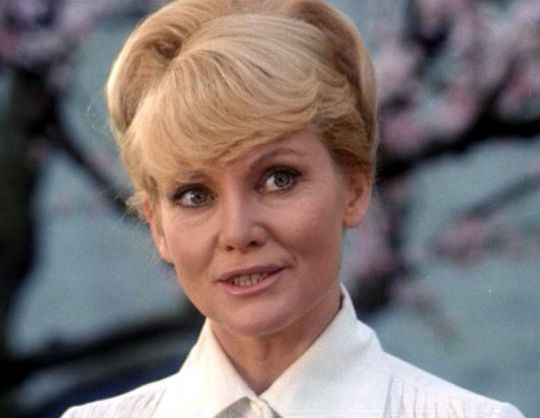
24- Miss Rose (Diane Cilento). The Wicker Man (1973).
If you’re here for the 2006 Nicholas Cage remake of this movie, you can just leave right now.
The Wicker Man is a cult-classic cinematic masterpiece described as a British mystery horror film from 1973. The movie follows the story of a religiously devout detective who is called to the mystical island of Summerisle to investigate the disappearance and possible ritual murder of a young girl. Unbeknownst to him, the islanders themselves manipulated him into coming to the island to partake in their own devoutly-held religious activities. Summerisle appears to be a final hold out of indigenous pagan practices, nature worship, and common local folklore that existed throughout the British Isles.
Over the course of the movie we see, better than any other interpretation I can think of, a relatively accurate illustration of a society with an integrated Pagan ethic. It is deeply engrained in the lives and minds of the population, from the schoolhouse to the once-hallowed church yard. Throughout the movie it is revealed that the island returned to these ancient practices only a few generations ago in an effort made by the past Lords of the island to help coerce the general population into continuing their agricultural sustenance—as in— the political power on the island used pagan motifs to keep the populace producing much needed exports that would keep the island alive.
There is a lot going on in this movie. We have Christopher Lee in ritual drag, raunchy sex going on in the cemetery, a lot of nudity, and a soundtrack that mirrors and incorporates religious beliefs and motifs through lyrics and verse. It really is unlike any other movie on this subject and, besides the unfortunate ending and overarching theme of human sacrifice, it does manage to convey some great insight into pagan philosophy and practices from the British Isles.***
For the sake of this project, I’ve chosen to highlight the character Miss Rose, played by Diane Cilento. Miss Rose first appears to us as the school teacher, instructing the young children of Summerisle in their magical correspondences and traditional May Day/Beltane lore. I’m sure the audience had mixed feelings when a classroom of young girls responded to Miss Rose’s question about what the May Pole represents with an unabashed “phallic symbol!” in unison, but I personally found it to be very progressive early sex education.
As the movie continues, it becomes clear that Miss Rose isn’t just a teacher for the young children. She’s also a kind of High Priestess of Summerisle (one of three) and further instructs young women in the art and tradition of a kind of pagan witchcraft. The rituals we see in the movie, particularly the fertility rite in which naked women are jumping over the fire to become imbued with divine energy, is highly reminiscent of some Alexandrian Wiccan rituals. Miss Rose, in many ways, reminds me of Maxine Sanders (#74) throughout this movie. It is said that the actress Diane Cilento herself jumped across the flames, allegedly identifying as a white witch at the time of filming.
Miss Rose serves as a foil to the arrogant detective throughout the movie. Where he is cold and heartless, she is kind and giving. Where he is rude and offensive, she is informative and strong with conviction. He represents the modern Christian mentality, always looking to drive out the witch in the countryside. She is the witch in the countryside, but has no fear of weaker men (or wicker men, for that matter). Miss Rose illustrates the primary leadership role women naturally have in Paganism and witchcraft, as both Summerisle’s lead educator and priestess.
Miss Rose is an adamant follower of her faith. She genuinely believes in its religious and ritual efficacy, and teaches the tradition to the next generation so as to continue its legacy. The version of Paganism that we see on Summerisle beautifully captures its seasonality, nature orientation, and the philosophy that human beings are creatures that fundamentally exist within nature, not above it. Through characters like Miss Rose, we see the full possibility of a society guided by nature-worship and magic. It truly is a beautiful thing, and the movie itself has become somewhat of a Pagan anthem/ occult-cult-classic. Apparently the movie is considered a horror, but I’ve always had a sense of perverse satisfaction from the story.
***Any mention of this movie when discussing actual Paganism or witchcraft would do itself a disservice if it didn’t address the Wicker Man/elephant in the room. The entire plot, and culminating scene, of the movie does involve human and animal sacrifice. The residents of Summerisle put the naive and arrogant detective, along with a hoard of livestock, into a human-shaped pyre called a Wicker Man. Historically, these were effigies allegedly built by the ancient Celts and Druids to be burned for religious sacrifice. There seems to be no consensus among historians as to whether or not the Druids and Celts actually performed human sacrifice, the belief being that the Romans and Greeks who made early contact with these cultures superimposed the outlandish rituals. The archeological record is inconclusive here, however, although more recently there does seem to be some evidence pointing to ritual sacrifice.
Modern pagans have largely re-embraced the wicker man for various holiday observances, of course without the human and animal sacrifice. Wicker men have been used as ritual effigies across Europe for centuries, and the practice continues to this day at events such as Burning Man. The possible historical past of Paganism and its association with human sacrifice is unforgivable, however it bares no hold on modern Pagan revivals. Contemporary groups have distanced themselves time and time again from ritual human and animal sacrifice, as the religious philosophy of most Pagan traditions celebrates all forms of life, promoting environmentalism, vegetarianism, and humanism.
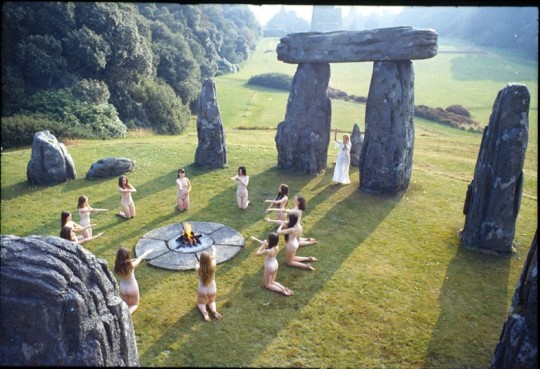
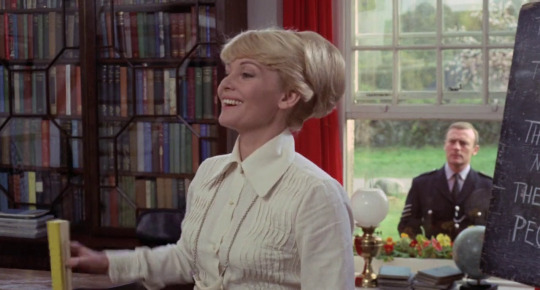
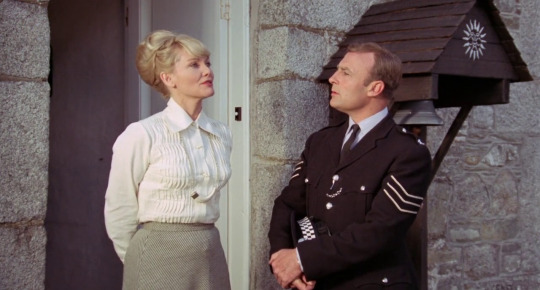
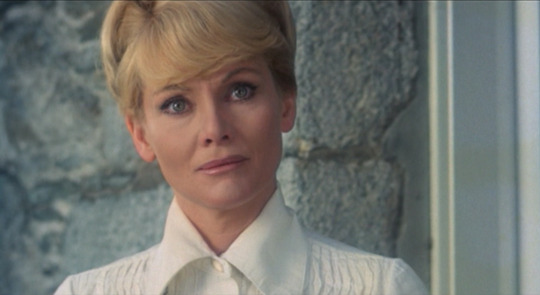
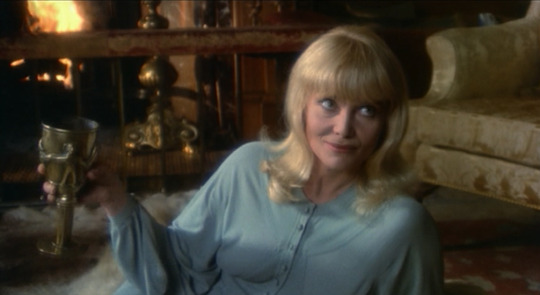
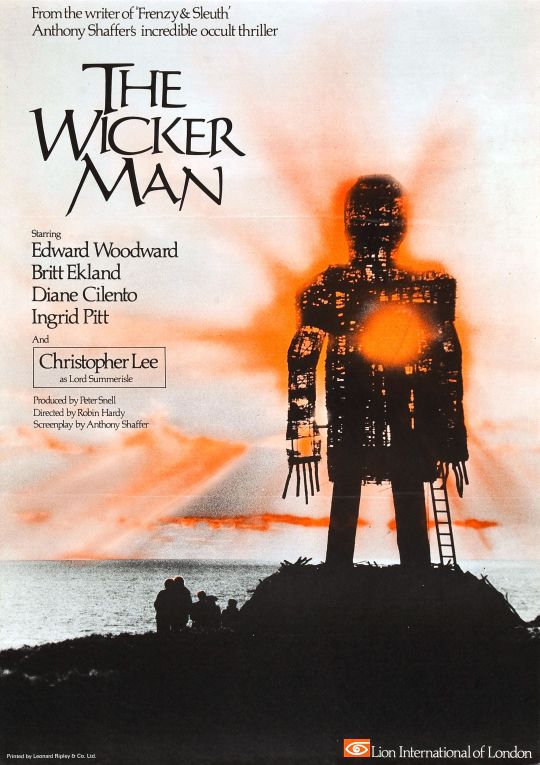



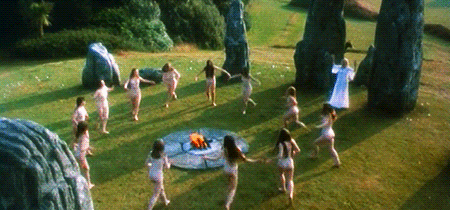
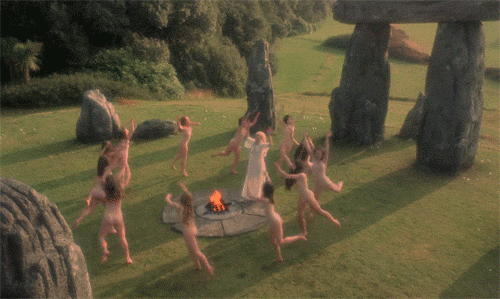
#witch#witches#witchblr#witchcraft#100witches#halloween#samhain#pagan#paganism#wicca#coven#magic#occult#the wicker man#christopher lee#miss rose#diane cilento#wicker man#1973
589 notes
·
View notes